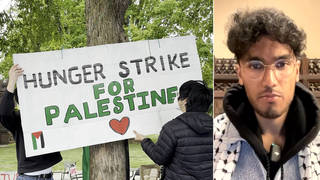
Guests
- Sergio Espanaa student organizer at the University of Maryland. He joins us in Washington.
Students at the University of Maryland, Baltimore County, are beginning a five-day fast on Monday to protest the war in Iraq. The action is being dubbed Hungry for Peace. Several other campuses are staging similar fasts. [includes rush transcript]
Transcript
AMY GOODMAN: And we’re going to turn now to, as we end the broadcast, another story on student activism. Students at the University of Maryland, Baltimore County, are beginning a five-day fast Monday to protest the war in Iraq. It’s being called “Hungry for Peace.” A number of other campuses are staging similar fasts.
Sergio Espana is with us. He’s a student organizer at the University of Maryland. Can you talk in this last minute, Sergio, about what you’re doing at the University of Maryland?
SERGIO ESPANA: Yeah. So we’re having students and faculty having a fast and a sit-out for five days, protesting the illegal U.S. occupation in Iraq. Every day of the fast will represent roughly 100,000 of the more than 500,000 Iraqi civilians that have died as a direct consequence of this illegal occupation. We’ll also have a lecture series.
Now, across the nation, thanks in large part to the Student Peace Action Network, we’ve had universities from California to Vermont who will also be contributing. So these fasts are nationwide. For example, in Minnesota, apart from the fast, there will also be rallies going into their congressional representatives, turning in petitions, letting them know that the American public wants them to do the job that they were actually elected to do, which is to, you know, support the American public, support the troops and to end this immoral and atrocious war.
JUAN GONZALEZ: And how has student support been growing against the war in Iraq?
SERGIO ESPANA: Well, the growth has been tremendous. The real sadness is that the antiwar movement has been strong since before the war actually started. For well over five years, students and peace activists across the country have engaged in protests, call-ins, letter writings, and so on and so forth, yet our elected officials fail to do what the majority of the American public want them to do. So now we feel that we have no choice but to up the ante and to actually partially sacrifice our bodies. And if that’s what it takes to galvanize our elected officials, then we are willing to make that sacrifice, one that is extremely minute when compared to the hundreds of thousands of lives that have been taken because of this illegal occupation.
AMY GOODMAN: Sergio, what is the response of the administration, and how many students do you think will be involved?
SERGIO ESPANA: Well, so far, the administration is comfortable with it. And as for students being involved, we have, just on our campus that are going to be doing it week-long, we have eight and a couple of faculty members, but — that are going to be fasting throughout the course of the week, we have well over 20.
AMY GOODMAN: Well, I want to thank you for being with us, Sergio Espana, student at University of Maryland, Baltimore County, one of the organizers of next week’s Hungry for Peace fast.












Media Options